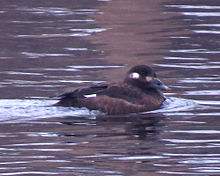White-winged scoter
| White-winged scoter | |
|---|---|
 |
|
| Adult male of the American race deglandi | |
 |
|
| Female, Ottawa | |
| Scientific classification | |
| Kingdom: | Animalia |
| Phylum: | Chordata |
| Class: | Aves |
| Order: | Anseriformes |
| Family: | Anatidae |
| Subfamily: | Merginae |
| Genus: | Melanitta |
| Subgenus: | (Melanitta) |
| Species: | M. deglandi |
| Binomial name | |
|
Melanitta deglandi (Bonaparte, 1850) |
|
| Subspecies | |
|
|
| Synonyms | |
|
Melanitta fusca deglandi |
|
Melanitta fusca deglandi
Melanitta fusca stejnegeri
The white-winged scoter (Melanitta deglandi) is a large sea duck. The genus name is derived from Ancient Greek melas "black" and netta "duck". The species name commemorates French ornithologist Côme Damien Degland.
The white-winged scoter is one of three North American scoter species and the largest species of scoter. It is characterised by its bulky shape and large bill. Females range from 950–1,950 g (2.09–4.30 lb) and 48–56 cm (19–22 in), averaging 1,180 g (2.60 lb) and 52.3 cm (20.6 in). She is brown with pale head patches. The male ranges from 1,360–2,128 g (2.998–4.691 lb) and from 53–60 cm (21–24 in), averaging 1,380 g (3.04 lb) and 55 cm (22 in). He is all black, except for white around the eye and a white speculum. This scoter's bill has a black base and a large knob.
There are a number of differing characteristics of the Eastern Siberian race and the American race from Alaska and Canada to west of the Hudson Bay. Males of the American subspecies have browner flanks, dark yellow coloration of most of the bill and a less tall bill knob, approaching the velvet scoter. The Asian form has a very tall knob at the base of its mostly orange-yellow bill. Females are identical in the field.
The Latin binomial commemorates the French zoologist Dr. Côme-Damien Degland (1787–1856).
It was formerly considered to be conspecific with the velvet scoter, and some taxonomists still regard it as so. These two species, and the surf scoter, are placed in the subgenus Melanitta, distinct from the subgenus Oidemia, black and common scoters. The subspecies stejnegeri has been suggested to be a full species, according to a new study.
The white-winged scoter breeds over the far north of Asia east of the Yenisey Basin, and North America. It winters further south in temperate zones, on the Great Lakes, the coasts of the northern United States and the southern coasts of Canada, and Asia as far south as China. It forms large flocks on suitable coastal waters. These are tightly packed, and the birds tend to take off together.
...
Wikipedia

